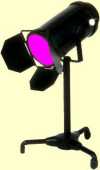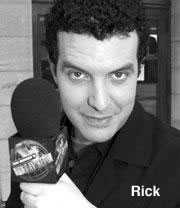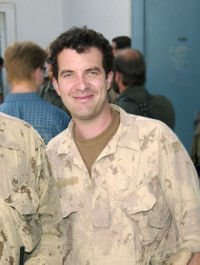 Richard Vincent (Rick) Mercer (born October 17, 1969 in St. John's, Newfoundland and Labrador), is a Canadian comedian and television personality.
Mercer first came to national attention in 1990, when he premiered his one-man show Show Me the Button, I'll Push It, or Charles Lynch Must Die at the National Arts Centre in Ottawa. A pointed, satirical political commentary on Canadian life after Meech Lake, Show Me the Button made Mercer a national star as he toured the show across Canada.
He dropped out of high school before completing his diploma requirements and was given an honorary one.
Richard Vincent (Rick) Mercer (born October 17, 1969 in St. John's, Newfoundland and Labrador), is a Canadian comedian and television personality.
Mercer first came to national attention in 1990, when he premiered his one-man show Show Me the Button, I'll Push It, or Charles Lynch Must Die at the National Arts Centre in Ottawa. A pointed, satirical political commentary on Canadian life after Meech Lake, Show Me the Button made Mercer a national star as he toured the show across Canada.
He dropped out of high school before completing his diploma requirements and was given an honorary one.
This Hour Has 22 Minutes
In 1992, he created and performed his second show, I've Killed Before, I'll Kill Again, which was also a popular touring show. Also in that year, he began to work with former CODCO members Cathy Jones, Mary Walsh, and with fellow Newfoundlander Greg Thomey, to create a new television series for CBC Television which became This Hour Has 22 Minutes. In the first eight seasons of 22 Minutes, Mercer provided some of the show's signature moments, including having lunch at a Harvey's fast food restaurant with then Canadian Prime Minister Jean Chrétien, and an Internet petition (on the 22 Minutes website) to force Canadian Alliance leader Stockwell Day to change his first name to Doris.
Mercer's one-minute "rants", in which he would speak directly to the camera about a current political issue, quickly became the show's signature segment. In 1998, he published a book, Streeters, which compiled many of his most famous 22 Minutes rants. It quickly became a national bestseller.
In the first eight seasons of 22 Minutes, Mercer provided some of the show's signature moments, including having lunch at a Harvey's fast food restaurant with then Canadian Prime Minister Jean Chrétien, and an Internet petition (on the 22 Minutes website) to force Canadian Alliance leader Stockwell Day to change his first name to Doris.
Mercer's one-minute "rants", in which he would speak directly to the camera about a current political issue, quickly became the show's signature segment. In 1998, he published a book, Streeters, which compiled many of his most famous 22 Minutes rants. It quickly became a national bestseller.
Talking to Americans
 One of Mercer's trademark comedy routines on 22 Minutes was "Talking to Americans" in which he would travel to major American cities and conduct on-the-street interviews with average Americans regarding Canadian politics, the weather, etc., often with hilarious results as the subject's ignorance about Canada was illustrated. One famous example saw Mercer asking Americans' opinion on whether Canada should change its "20 Hour Clock" to the 24 hour one used by the United States. He received approval from citizens and the Governor of Iowa Tom Vilsack. On another occasion he got the support of Arkansas Governor Mike Huckabee in calling on Canadians to save the "National Igloo."
Mercer made international headlines in 2000 when he pulled a "Talking to Americans" stunt on then-presidential candidate George W. Bush. He successfully got Bush to answer questions about non-existent Canadian Prime Minister "Jean Poutine" (a play on the real politician's name, Jean Chrétien and popular Canadian -- especially Québécois -- dish poutine). Bush was not amused at the time, and has since then refused to accept any interviews from the CBC. However, he did make a joking reference to this incident during his visit to Canada in 2004. In the same US election campaign, Mercer asked Democratic candidate Al Gore to promise to visit the Canadian capital city of Toronto after his election (Canada's capital is Ottawa). Gore did not question Mercer's incorrect identification of the capital of Canada.
In 2001, Mercer co-produced a CBC special based on "Talking to Americans", which attracted 2.7 million Canadian viewers - the highest-rated comedy special in the history of CBC. Later, the respected ABC News program Nightline would devote a show to it. This was his last major project related to 22 Minutes -- at the end of the 2000-2001 season, he announced his departure from that show. It was rumoured that part of the reason he had decided to leave was due to a long-standing feud with his co-star Mary Walsh.
One of Mercer's trademark comedy routines on 22 Minutes was "Talking to Americans" in which he would travel to major American cities and conduct on-the-street interviews with average Americans regarding Canadian politics, the weather, etc., often with hilarious results as the subject's ignorance about Canada was illustrated. One famous example saw Mercer asking Americans' opinion on whether Canada should change its "20 Hour Clock" to the 24 hour one used by the United States. He received approval from citizens and the Governor of Iowa Tom Vilsack. On another occasion he got the support of Arkansas Governor Mike Huckabee in calling on Canadians to save the "National Igloo."
Mercer made international headlines in 2000 when he pulled a "Talking to Americans" stunt on then-presidential candidate George W. Bush. He successfully got Bush to answer questions about non-existent Canadian Prime Minister "Jean Poutine" (a play on the real politician's name, Jean Chrétien and popular Canadian -- especially Québécois -- dish poutine). Bush was not amused at the time, and has since then refused to accept any interviews from the CBC. However, he did make a joking reference to this incident during his visit to Canada in 2004. In the same US election campaign, Mercer asked Democratic candidate Al Gore to promise to visit the Canadian capital city of Toronto after his election (Canada's capital is Ottawa). Gore did not question Mercer's incorrect identification of the capital of Canada.
In 2001, Mercer co-produced a CBC special based on "Talking to Americans", which attracted 2.7 million Canadian viewers - the highest-rated comedy special in the history of CBC. Later, the respected ABC News program Nightline would devote a show to it. This was his last major project related to 22 Minutes -- at the end of the 2000-2001 season, he announced his departure from that show. It was rumoured that part of the reason he had decided to leave was due to a long-standing feud with his co-star Mary Walsh.
Made in Canada In 1998, Mercer created, wrote and performed on his own sitcom, Made In Canada, which ended its run in 2003. Made in Canada was produced by Island Edge Inc., Mercer's own production company. A satire of the Canadian film and television industry, the show aired outside of Canada as The Industry. There were 65 episodes of Made In Canada produced, the final of which, "The Last Show," won Mercer a Gemini Award for Best Writing in a Comedy or Variety Program or Series. The episode also marked his directorial debut.
The Rick Mercer Report In 2003, Made in Canada ended its run as well, and Mercer began to work on a new CBC series, Rick Mercer's Monday Report. Similar in format to 22 Minutes and The Daily Show, the show debuted in January 2004. Also in 2003, Mercer went to Afghanistan to visit the Canadian troops stationed there, resulting in the television special Christmas in Kabul. Despite reports of a long-standing feud Mercer invited Walsh to appear on Monday Report as a special guest to promote her own series Hatching, Matching and Dispatching.
During his press tour to promote the series, Mercer came out as gay in The Globe and Mail newspaper. His long-time partner in life and business is Gerald Lunz. Beyond those details, Mercer continues to insist on his right to keep his personal life as private as possible.

At the end of its second season, Monday Report was the highest rated arts and entertainment show on the CBC. Mercer has had a who's who from the world of Canadian entertainment and politics appear as guests on his show. Ex-Prime Minister Paul Martin gave him a private tour of 24 Sussex Drive and former New Democratic Party leader Ed Broadbent made snow angels with Mercer on Parliament Hill. Other prominent guests were NDP leader Jack Layton, Conservative Party leader Stephen Harper (now Prime Minster), then-Conservative MP Belinda Stronach, and Conservative MP Peter MacKay, Newfoundland and Labrador Premier Danny Williams, Olympic gold medalist Kyle Shewfelt, author Pierre Berton, and recording artists Jann Arden, Bif Naked, and Sarah McLachlan. When Mercer hosted a relief benefit concert for the victims of the 2004 Indian Ocean tsunami at the Pengrowth Saddledome in Calgary, musical guests Barenaked Ladies appeared in a segment Mercer shot backstage completely naked. Since Mercer launched his own show, he became a regular target of his old show 22 Minutes. Criticism of Mercer focused mostly on his ongoing support of the Canadian Forces and his personal wealth. In 2005, the CBC moved Monday Report to Tuesday nights, which caused the show's name to be changed to The Rick Mercer Report. On his blog, Mercer wrote of the time slot shift that "we ended the season as the highest rated comedy show on the network. Clearly some drastic changes were needed."
Awards Mercer has received more than 20 Gemini Awards for his television work. He has also been a winner of the prestigious Sir Peter Ustinov Award, presented to him at the 2003 Banff Television Festival. In 1993, Newfoundland premier Clyde Wells honoured Mercer with the Newfoundland and Labrador Arts Council's Artist of the Year award. In 2004, Mercer was presented with the Governor General's Performing Arts Award. Mercer donated his $15,000 cash prize to the LSPU hall, the theatre in Newfoundland where Mercer performed his early work. Mercer holds honorary degrees from Laurentian University in Greater Sudbury and Memorial University of Newfoundland in St. John's. Rick Mercer received a honorary high school diploma for his outstanding efforts and determination from Landmark East School in Wolfville, Nova Scotia.
Spokesperson and endorsements In December, 2004, Mercer appeared on the commercials advertising the one-tonne challenge for the Government of Canada. Mercer also appeared as a model in a national ad for men's clothing store Harry Rosen wearing a Canali suit. All of Mercer's fees for the campaign went to Casey House, a hospice in Toronto for people living with AIDS. Casey House was founded by June Callwood, who appeared as a celebrity guest on Monday Report. In September of 2005, Mercer became the National Spokesperson for the 2005 Walk For Life. The Walk for Life is a series of 132 fundraising walks across Canada that raise money for people living with HIV/AIDS. The Walk for Life is a project of the Canadian AIDS Society. Mercer has also narrated an animated science video on climate change for Science North in Sudbury.

No comments:
Post a Comment